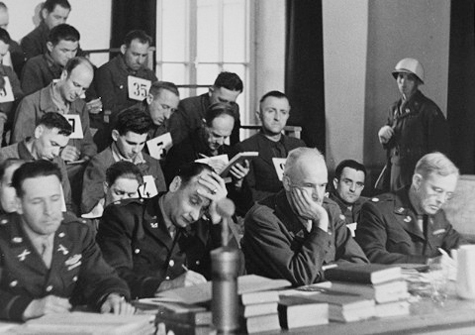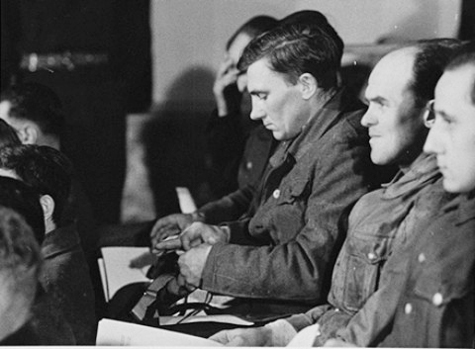Dachau TrialsUS. vs. Hans Altfuldisch, et alPrevious The proceedings against the 61 accused war criminals associated with the Mauthausen concentration camp began on March 29, 1946. All were charged with participating in a "common design" to violate the Laws and Usages of War under the 1929 Geneva Convention. The chief defense counsel was Lt. Col. Ernst Oeding, a German-American who could speak German fluently. Before the opening statements were made, Oeding moved to quash the charges, arguing that "Common design is not a crime." The chief prosecutor, Lt. Col. William Denson, was prepared to quote Black's law dictionary, but Oeding's motion was quickly denied by Maj. Gen. Fay B. Prickett, the president of the 8-man tribunal which was both the judge and the jury.  Oeding tried his best to get the charges dropped, pointing out that the charge sheet included 18 types of crimes, allegedly committed over a period of three and a half years, but the charges did not list which crime was committed by which of the 61 men on trial, nor the names of the victims. The charge against each of the men was that they had participated in a common design to violate the Laws and Usages of War under the Geneva Convention of 1929. Lt. Col. Denson's opening statement was as follows: May it please the court, we expect the evidence to show that the victims of Mauthausen and its by-camps were gathered from countries at war with Germany or overrun by the German army. We expect the evidence to show that these victims constituted in the main the intelligentsia of continental Europe, persons who had the intestinal fortitude to stand up against the Nazi yoke of oppression. We expect the evidence to show that somewhere between 165,000 and a million and a half persons were killed in the camps of Mauthausen; that these prisoners were used in such a manner as to derive the greatest economic value from their services and were fed a diet that was calculated ultimately to end in their death. Mauthausen and its by-camps were nothing more than a many-headed hydra of extermination and these sixty-one men on trial before this court encouraged, aided, abetted, or participated in a common design to subject its prisoners to killings, beatings, and tortures. Denson's basic argument in all the trials of the concentration camp war criminals was that the men on trial were guilty of a crime because they had remained loyal to their country, and had worked within the Nazi system, rather than turn against Hitler and refuse to follow orders. It was brought out in court that no staff member in a Nazi concentration camp was ever executed for refusing to follow an order. In Denson's opinion, the resistance fighters from German-occupied countries who had continued to fight as partisans, killing German soldiers and blowing up trains, were innocent victims because they had been illegally imprisoned at Mauthausen after they were captured. Although the Geneva Convention of 1929 did not give the same rights to insurgents as to Prisoners of War, it was the prosecution's opinion that the partisans and resistance fighters in German-occupied countries were the equivalent of POWs and entitled to the same Geneva Convention protection. Continuing to fight after one's country had surrendered was against the Geneva convention, so putting captured partisans into a prison camp, or even executing them, was not against international law during World War II. However, it was against the Geneva Convention to put Prisoners of War into a concentration camp. Hitler's justification for doing this was that he thought it was wrong for a commando like US Navy Lt. Jack Taylor to go behind enemy lines, commit an act of sabotage, then surrender and expect to be treated as a Prisoner of War according to the rules of the Geneva convention. Germany's most famous commando, Otto Skorzeny, was not treated as a Prisoner of War after he surrendered to the Allies in May 1945; he was deprived of his rights under the Geneva Convention and held in prison without charges for two years until he was put on trial in 1947 as a war criminal in another case that was tried at Dachau by the American Military Tribunal. Lt. Col. Denson turned down the job of prosecutor in the Skorzeny case because he considered Skorzeny to be a hero. Although Skorzeny was acquitted after testimony by a defense witness that the Allies had committed the same crime that Skorzeny was charged with, he was not released from prison; he finally escaped on July 27, 1948 and fled to Argentina. One thing that the tribunal at Dachau would not tolerate was any mention that Americans had committed some of the same war crimes as the Germans; all such remarks by the accused were stricken from the record. The term that was frequently used by critics to describe the American Military Tribunals at Dachau was "Victor's Justice."  The proceedings of the American Military Tribunals at Dachau were not conducted like a typical trial in America. The accused were designated as war criminals from the moment that they were arrested, on the theory that they became war criminals at the time that they committed the crime that they were accused of. The burden of proof was on the accused war criminals, not on the prosecution, because they were regarded as guilty until proven innocent. The defense attorneys were also American military personnel. Deprived of their Geneva Convention rights as POWs, the Mauthausen war criminals were interrogated by Jewish officers in the American military and confessions were obtained from most of them. One after another, the accused in the Mauthausen trial testified on the witness stand that they had been forced, by threats and beatings, to sign confessions which were dictated to them. In spite of this, they were all convicted and the chief interrogator in the Mauthausen case, Lt. Paul Guth, was never held accountable for his alleged actions. In 1949, the rules of the Geneva Convention were changed so that resistance fighters, partisans, guerrilla fighters and insurgents in occupied countries now have the same rights as Prisoners of War if they meet certain requirements. Under the 1929 Geneva Convention, only captured soldiers fighting in uniform for a country that was at war were recognized as Prisoners of War. In the American Military Tribunals at Dachau, resistance fighters from occupied countries, who were called "terrorists" and "bandits" by the Germans, were erroneously claimed by the prosecution to have the same rights as Prisoners of War under the Geneva Convention. Consequently, the prosecution maintained that all the concentration camp staff members were automatically guilty of a war crime because insurgents, who were actually fighting in violation of the 1929 Geneva Convention themselves, had been held as prisoners in the camps. Testimony of Lt. Jack TaylorGas Chamber TestimonyConfessions of the AccusedProsecution WitnessesThe testimony of Willy FreyBack to Start of Mauthausen TrialThe Case against August EigruberThe Defense CaseTrial of Spanish KaposFranz Kofler TrialBack to Dachau TrialsBack to Mauthausen indexHomeThis page was last updated on December 6, 2007
|